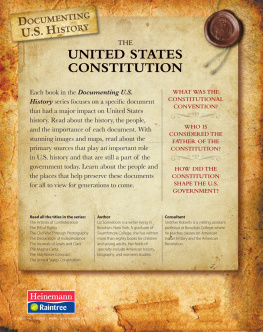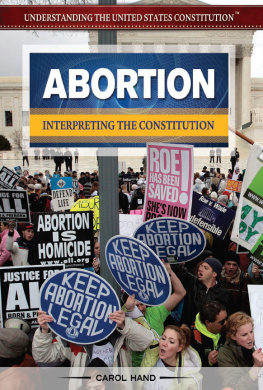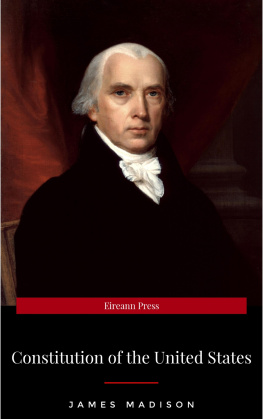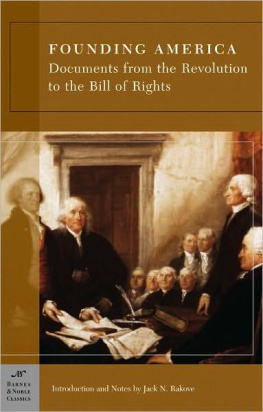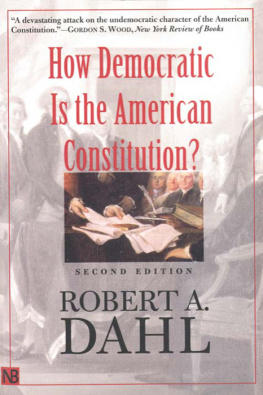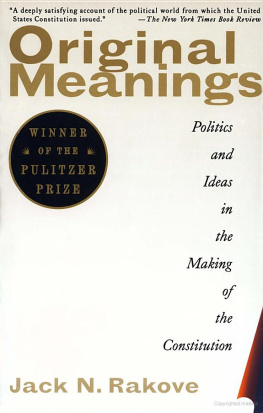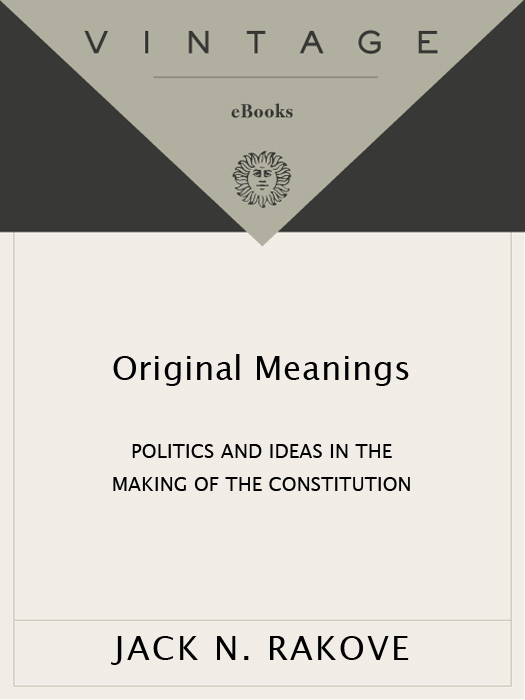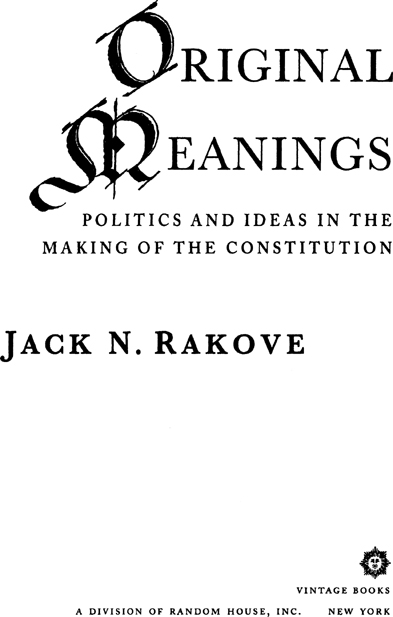J ACK N. R AKOVE
Jack N. Rakove was born in Chicago in 1947. He received his B.A. at Haverford College in 1968 and his Ph.D. from Harvard University in 1975. He taught at Colgate University from 1975 to 1980. Since 1980 he has been at Stanford University, where he is currently Coe Professor of History and American Studies. He is the author of The Beginnings of National Politics: An Interpretive History of the Continental Congress (1979) and James Madison and the Creation of the American Republic (1990), and he is the editor of Interpreting the Constitution: The Debate Over Original Intent (1990).
ACKNOWLEDGMENTS
The second great pleasure in completing a book is to acknowledge all those who helped make it possible.
I have benefited, first, from the support of Project 87; the National Endowment for the Humanities, which awarded me both a Constitutional Fellowship for a full year of research and two opportunities to teach this subject to seminars of college teachers and law professors; and the Stanford Humanities Center. Numerous bicentennial conferences, seminars, and lectures along the way helped me to refine my ideas. I owe special thanks to Bernard Bailyn for encouraging me to develop the original version of my argument in Perspectives in American History; to Jack Beatty for allowing me to reach a serious popular audience in The Atlantic, to Michael Lacey of the Woodrow Wilson Center, who offered me a valuable opportunity to work out my ideas on the complicated question of rights; and to Jane N. Garrett, my editor, for taking the long view.
Professor Bailyn did not intend to start me on this subject a quarter century ago, when he suggested that I write a seminar paper on the early uses of The Federalist. For me his work has always illustrated what another scholar (writing of Sir Lewis Namier) called the tremendous seriousness of the historians quest. More recently, his analysis of the debates of 178788 provided much of the framework within which I have tried to make sense of the division between Federalists and Anti-Federalists.
I owe similar intellectual debts to a select group of scholars whose writings have served as a foundation for my own. The first task I undertook in that seminar paper of 1969 was to read Gordon Woods dissertation; today I still return to the book it became to marvel at the sophistication of its arguments. My intellectual debt to Gordon is evident in nearly every chapter. In a field as massively researched as this one, it is impossible to cite all the scholars who have created the intellectual context within which my ideas have taken shape. But I wish to thank several colleagues whose writings have helped me most: John Phillip Reid, for providing a base point for my thinking on rights; Peter S. Onuf, whose work on federalism raises a host of theoretical and historical questions of the first magnitude; and Leonard Levy and Charles A. Lofgren, for their pioneering works in originalism. At a late date, an exchange of manuscripts and messages with Bruce Ackerman encouraged me to rethink the issues of legality and legitimacy surrounding ratification.
When I first took up this subject, my bemused colleagues Paul Brest and Thomas Grey of the Stanford Law School helped me to fathom the ongoing legal arguments over originalism. So did Robert Post of Boalt Hall, an old friend lost and found again across the Bay. A sometime lawyer, Elizabeth Kopelman, contributed much-needed research to some tangled questions of law and history.
Two other teams of lawyers contributed to this book. I acquired hands-on experience in a special form of originalism when I was retained by the law firm of Goodwin, Procter, & Hoar to work on Oneida Indian Nation v. New York, a case concerned with the original meaning of the Articles of Confederation. It is a distinct pleasure to acknowledge how much I learned about law office history from my association with Allan van Gestel, Jeffrey Bates, and Laura Carroll. Throughout the time I worked on this book, conferences and gigs of one kind or another took me to Washington, where I regularly enjoyed the hospitality of the prominent legal family of Jeffrey, the Honorable Ellen, Nikki, and Justin Huvelle.
Teaching in the countrys most amiable history department has been another source of support. But my most valued colleagues at Stanford have been the undergraduates who took my seminar on the making of the Constitution. Their ideas helped me time and again to think through the problems discussed in this book, and they also tolerated (admittedly under duress) my numerous digressions and feeble attempts at humor. I thank them all, but especially: Diane Abt, Daniel Aladjem, John Bezmalinovic, Carleen Chou, C. R. Douglas, Noah Fogelson, Greg Gottesman, Allison Hartwell (Eid), Charles Hokanson, Carla Holmes, David Johanson, Russell Korobkin, Jason Moore, Beth Morgan, Rob Price (who knows the original meaning of Weltanschauung), Donna Regensburg, Fred Schnabel, Mark Toft, Wendie Schneider, Kim Walsh, and, above all, Ourania Markou (Elbridge Gerrys biggest fan and my favorite source of baklava).
Two good friends read the completed manuscript and tried valiantly to curb my worst excesses. My collaboration with Ralph Lerner has now passed a decade, but in a sense it runs back to my boyhood and even my birthplace at the University of Chicago. As Ralph knows, there is more of Morgenthau than Strauss in my way of thinking, but in the ongoing debate between the latke and the hamantasch, I try to appreciate the virtues of both. James C. Turner is the one historian whose judgment I trust most, which is why I am doubly grateful that he was willing to read this work so closely despite a quarter centurys knowledge of my penchant for malapropisms of all flavors. Now I know what Professor Bailyn meant when he was heard to remark (after Jims orals) that here is a historian who can be held accountable for a great many errors. If his scholarly interests were closer to my own, I would have expected Jim to catch all the errors that doubtless remain.
Were it not for the constant demands of my family, who made me high priest of their own cult of domesticity, I might have finished this book years ago. My sons, Rob and Dan, have been a great delight every day of their lives. My wife, Helen, has tolerated this project with mild bemusement, but her nightly accounts of the foibles of practicing law inspire me to awake each morning thankful that I was created a historian. She has waited too many years to have a book dedicated to her, but its a debt of love long overdue.
Publication of this book will be a great relief to my mother, Shirley, and sister, Roberta, as well as to Michael and Max Plumpton. They know best how much it is a tribute to my father, Milton, and his memory. Everything I really know about politics, I learned from him.


